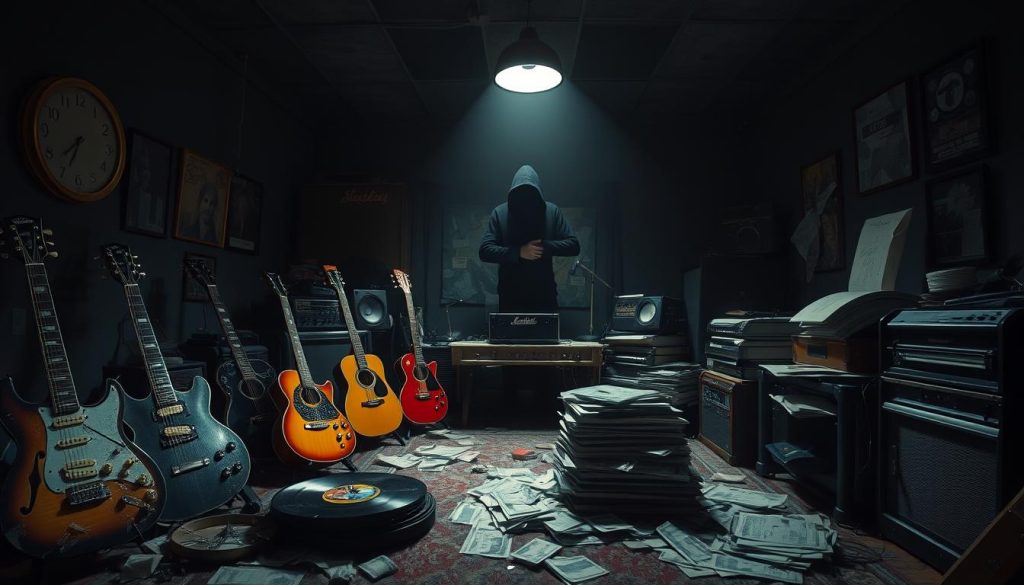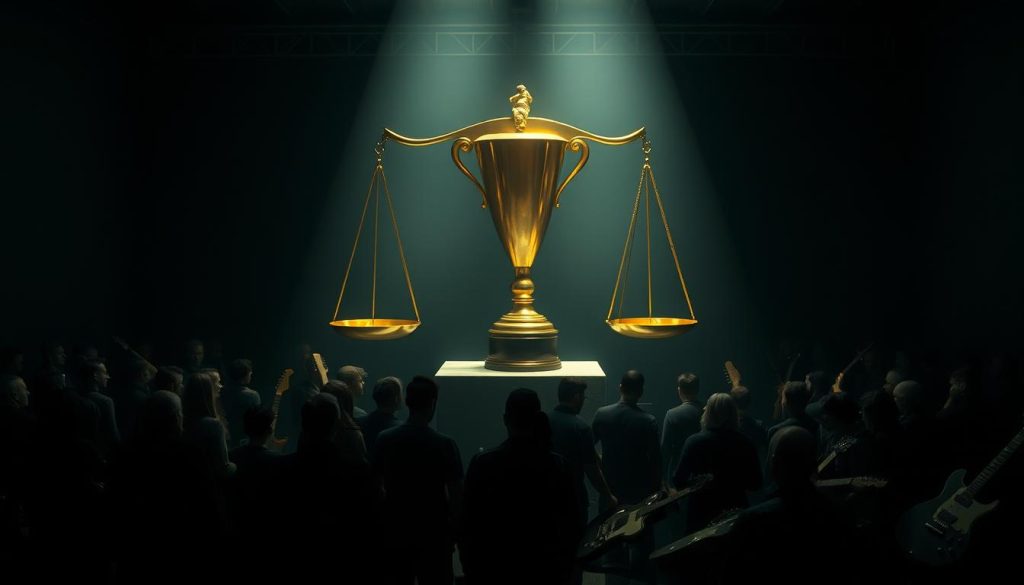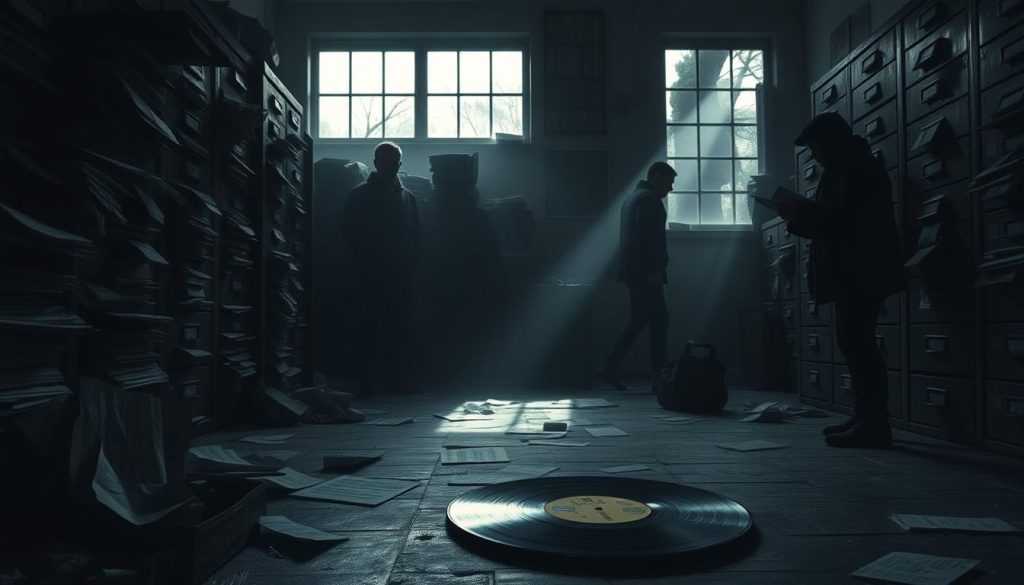As an independent musician, you’ve put your heart into your music. But, the music industry often doesn’t treat you fairly. The world of music distribution is full of1 shady practices, unreliable services, and unethical distributors. They care more about making money than about your well-being.
It’s time to expose the “Hall of Shame” – the worst music distributors who take advantage of independent musicians.
Many have shared their struggles with “The Hall of Shame: Worst Music Distributors Ripping Off Indie Artists.” It’s clear that getting fair distribution is a big problem. Indie artists like you are often left in a tough spot. Music distribution companies promise a lot but often don’t deliver. They ignore your rights and royalties.
Key Takeaways
- Indie artists face a harsh reality of shady music distribution practices
- Unreliable and unethical distributors prioritize profits over artist wellbeing
- Widespread industry issues with music distribution companies exploiting indie artists
- Indie musicians often struggle to get fair treatment and royalties
- Exposing the “Hall of Shame” of the worst music distributors is crucial
Shady Practices of Music Distribution Companies
Independent artists often deal with unreliable services and unethical practices from some music distribution companies2. These companies might charge too much, offer bad packaging, and not communicate well. This leaves artists feeling cheated and upset2.
Unreliable Music Distribution Services
Some music distributors are known for being unreliable. They might take months to pay artists their royalties or not tell them anything about their releases2. This can really hurt the success and money of indie musicians.
Unethical Music Distributors with Bad Reputation
Some distributors are unethical and have a bad history with indie artists2. They might not pay royalties, offer bad support, or not keep their promises2. Artists need to do their homework to avoid these problems.
“I paid to have my album professionally produced, but the distributor provided poor packaging, limited communication, and delayed reimbursing my studio costs. I received very few copies and made no profit – it was a clear case of being ‘ripped off’ by the distributor.”
– Shesk, MRR #339
Artists like Shesk share their bad experiences with poor music distribution companies2. These issues can really hurt indie artists’ careers and earnings. It shows we need more honesty and responsibility in the music world.
ASCAP: Taking from Indie Artists, Giving to Major Stars
The music world is known for its glamour, but a dark side exists. Indie artists face unfair treatment by the American Society of Composers, Authors, and Publishers (ASCAP)3. ASCAP, a key player in music rights, is accused of taking royalties meant for indie musicians. Instead, it gives them to the top 200 concert tours3.
ASCAP’s payment system shows a clear bias towards big names over unknown artists3. Even Zoe Keating, a classical musician, was denied a fair exception, despite ASCAP’s claim to support all music genres3.
“ASCAP’s actions are borderline criminal, as they are clearly taking from independent artists and giving money that they should be paid under the system to the most successful artists.”
The article strongly criticizes ASCAP for its unfair practices3. It calls for a change to fairly reward all artists, not just the famous ones3. By only supporting the biggest names, ASCAP misses its chance to help the diverse musical world3.
As the music scene grows, it’s vital for ASCAP to change its ways3. They must ensure fairness for all artists, from stars to indie creators3. This way, creativity and artistic expression can be truly celebrated and rewarded3.
worst music distributors Cutting Royalties for Independent Musicians
The music industry faces big problems with worst music distributors and poor music distribution companies. They take advantage of independent musicians by cutting royalties. This leaves many indie artists struggling, despite their talent and hard work4.
Poor Music Distribution Companies with Substandard Services
Many digital distribution services help independent musicians, like DistroKid and TuneCore. They keep 100% of rights and collect royalties worldwide4. But, some poor music distribution companies don’t meet these standards4.
These unreliable music distribution providers often delay payments and offer bad service. They provide poor packaging, leaving indie artists with little to show for their work4. A musician named “Shesk” had a bad experience with Jungle Records. He paid for studio time and production but made no profit, losing years of his work to the distributor4.
The struggles of independent musicians show the need for fair treatment in the industry4. As music changes, it’s key for indie artists to learn about their options. They must make smart choices to protect their rights and earnings4.
Unprofessional Music Distributors Exploiting Indie Artists
In the music world, indie artists often face big challenges with distributors. Sadly, some unprofessional music distributors take advantage of these artists. They use their limited resources and vulnerabilities for their own gain. This has left many musicians feeling cheated and losing faith in the industry.
Shesk, a musician, had a bad experience with Jungle Records in 19845. Shesk paid for professional production but got poor packaging and delayed payments. They received few copies and made no profit, showing how a unprofessional and exploitative distributor can harm artists.
Shesk’s story is not unique. Unprofessional music distributors often offer bad services and unfair deals. This has stopped many talented artists from getting the recognition and money they deserve.
Indie artists face many challenges in getting their music out and earning fair pay5. DIY distributors helped artists earn $1.8 billion in 2023, but this is only 5% of the global music industry5. DistroKid distributes thousands of songs daily, showing the volume of content5. Jonah Baker, for example, makes $200,000 a year from streaming and has over 150 million streams.
But the industry has its problems5. Viper’s song “Fusion” was removed by DistroKid due to fake streams, despite being in official playlists5. Many artists have faced bot attacks, getting fake streams and followers5. It’s said that 100% of streams for some tracks were fake, casting doubt on stream accuracy.
These stories highlight the need for change in the music industry. Even in the digital age, unprofessional and exploitative practices still exist. It’s important to expose and stop these behaviors to create a fairer music world.
Untrustworthy Music Distribution Platforms
For indie musicians, finding the right music distribution platform can be tough. “Shesk,” an artist, had a bad experience with Jungle Records6. Despite spending on studio time and production, Shesk got poor packaging, little communication, and delayed payments. They got few copies of their album and made no money.
Shesk’s story shows the dangers indie artists face with untrustworthy platforms. These platforms often don’t offer the support and service needed. This leaves artists at risk of losing money and not reaching their audience.
Unreliable Record Distribution Companies
Indie artists also face challenges with unreliable record distribution companies. These companies promise to get music on streaming platforms and retail stores. But, they often fail, leaving artists without the promised visibility and earnings.
What sets trustworthy platforms apart is their transparency and accountability7. Platforms like TuneCore and DistroKid offer 100% artist-retained royalties and quick distribution. But, others take a big cut of earnings or have slow distribution.
The quality of customer support is also key8. Some distributors, like Deliver My Tune, offer 24/7 support. Others have poor communication and slow responses, leaving artists stranded.
Indie artists need to be careful when choosing a platform or company. They should do their research and listen to other musicians’ experiences. By avoiding untrustworthy options, artists can better reach their audience and enjoy the fruits of their labor678.
Indie Musicians’ Struggles with Shady Distributors
Independent musicians face a tough road in the music world. They deal with unfair distribution practices9. Streaming royalties are key, but they’re still very low. This makes it hard for artists to earn a living9.
Some distributors take advantage of these artists for their own gain. This is unfair and hurts the artists’ chances to succeed.
Zoe Keating, a cellist, knows this struggle well. She had issues with ASCAP, a major licensing group9. ASCAP took royalties meant for indie artists and gave them to big names instead. This shows a big problem in the industry.
“Shesk” also faced trouble with Jungle Records. He paid for his album “Beating the Meat” but felt cheated9. Stories like these are common. Indie artists often can’t fight back against unfair practices.
The music world needs more honesty and fairness10. Spotify is trying to help by moving money to real artists and stopping fake streams10. But more action is needed to protect indie artists.
It’s vital for indie musicians to have honest and fair ways to share their music. This way, their talent and creativity can shine. Only then can the independent music scene really flourish.
Conclusion: Exposing the Worst in Music Distribution
This long-form piece has uncovered the shady practices of some worst music distribution companies and platforms. ASCAP has been accused of taking performance royalties meant for indie artists. Distributors like Jungle Records are known for their unreliable and unprofessional behavior11.
These examples show the struggles indie musicians face in getting their music out there. They want to be fairly compensated for their work12.
But, there’s hope. Some indie labels have found success in the tough music industry. For example, the Merlin Network saw a huge jump in payments from Spotify between 2011 and 2012. This shows that with the right approach, indie labels can thrive13.
FAQ
What are some examples of the worst music distributors ripping off indie artists?
Can you provide more details on the challenges indie musicians faced with unreliable music distribution services?
What are some examples of unethical music distributors with a bad reputation?
Can you explain how ASCAP was taking from indie artists and giving to major stars?
What issues did independent musicians face with poor music distribution companies cutting their royalties?
Can you share more about the exploitative practices of unprofessional music distributors?
What are some examples of untrustworthy music distribution platforms that independent musicians should be wary of?
Source Links
- How a songwriter in his 60s broke back into the music industry
- 5 Big Mistakes Artists Make When Distributing Music Online
- How ASCAP Takes Money From Successful Indie Artists And Gives It To Giant Rock Stars
- No title found
- Takedown Fails: Artists Are Seeing Their Music Removed From DSPs for Streaming Fraud They Didn’t Commit
- The Truth About DistroKid (Review)
- Deliver My Tune vs.
- DistroKid Review (2022): An Honest & Detailed Look at the Pros and Cons
- A surprising shady tale regarding DistroKid – Page 2
- Spotify is changing its royalty model to crush streaming fraud and introduce a minimum threshold for payment
- Piracy in the Music Business-Courtney Love
- Courtney Love does the math
- Criticism of Spotify



